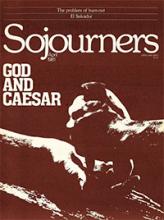We were only a small group of people of faith in Louisville, Kentucky--not exactly the center of national power. And for some of us, at least, it was becoming a problem of faith: Is God really Lord of history, or are the forces of nuclear madness in control?
We were becoming increasingly aware of dangerous and powerful forces moving us toward a nuclear war that would end the lives of those we love. We were experiencing some fear, despair, and frustration because we seemed unable to divert those forces. Was there some way we could participate in God's activity so that we would not simply be waging a lonely and losing battle against the principalities and powers?
And so we were driven, not by clever strategizing, but by our own need for faith, to meet together to pray.
It was the Sunday evening before Hiroshima Day, 1978, at a downtown Presbyterian church, when we first met to pray for peace. We invited respected representatives from various denominations who shared a concern for peacemaking to lead our prayers and meditations.
The service had been announced in church bulletins and during congregational services. But primarily we relied on personal invitations: We got busy asking individual members of our congregations to come and offered to give them rides. Not only did a large number of people come, but we were given an indication of interest and need that resulted in a sense of shared community with fellow church members from all over Louisville. The service had an impact on the ongoing life of all our congregations. Ever since then, prayer for peace has been a likely occurrence in regular Sunday morning worship services around town.
Read the Full Article

